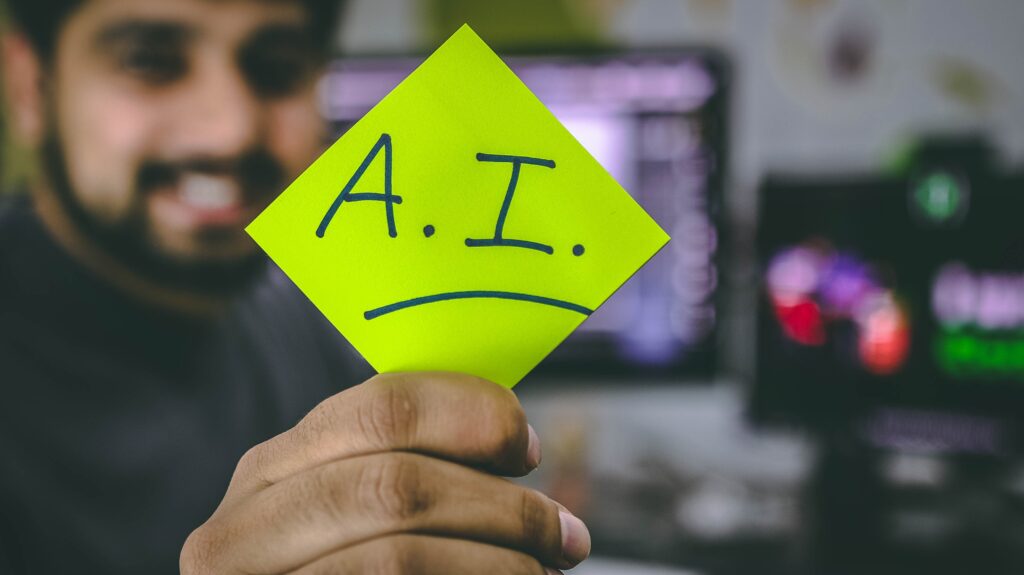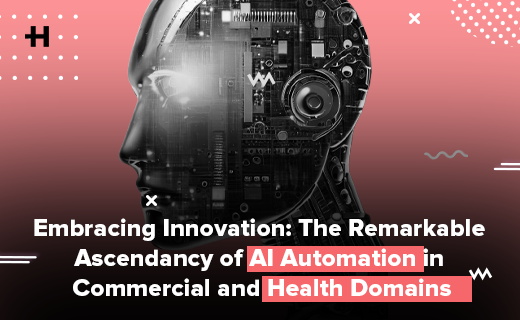Discover the transformative power of AI automation in modern businesses. Learn how the integration of AI and automation technologies revolutionizes operations, enhances customer experiences, and drives efficiency. From perpetual optimization to cross-channel strategy and data analysis, explore the advantages and impacts of AI automation across various sectors. Delve into its role in healthcare, where it reshapes patient care, research, and administration. Join us as we explore the future of AI automation and its potential to shape the way we do business.

Table of Contents
Understanding AI Automation
AI Automation is the integration of AI, including machine learning and deep learning, with automation technologies. It combines the task-oriented capabilities of automation with the learning and problem-solving potential of AI.
In essence, while automation involves machines performing repetitive tasks based on explicit instructions given by humans, AI introduces the ability for machines to learn from data, make decisions, and improve over time. AI automation, therefore, is the synergistic combination of these technologies, allowing machines to carry out complex tasks, learn from their actions, and optimize their performance without requiring constant human intervention.
How Does AI Automation Work?
The power of AI automation stems from its ability to leverage machine learning and deep learning. Machine learning involves algorithms that learn from data and improve their performance over time without being explicitly programmed to do so. Deep learning, a subset of machine learning, uses neural networks to mimic the workings of the human brain, allowing machines to make decisions in a way that’s similar to how humans do.
When applied to automation, these capabilities mean that not only can tasks be carried out swiftly and accurately, but they can also be adapted and optimized based on the machine’s learning. This adaptive nature of AI automation is what sets it apart from traditional automation.
AI automation can analyze large amounts of data, identify patterns, make predictions, and execute tasks based on its findings. It can also adapt its actions based on changes in the environment or data it’s processing, leading to improved efficiency and effectiveness over time.
Automation and Its Role in Modern Businesses
At its core, automation is the process of assigning repetitive, predictable tasks to machines. This process is governed by explicit instructions or workflows designed by humans. A typical example could be a machine in a factory consistently manufacturing the same part. Such tasks necessitate manual configuration and human oversight for efficient execution, as humans must predict all potential actions to ensure the machine behaves as expected. Consequently, this requires continuous vigilance—if the environment changes, manual intervention is needed for necessary adjustments.
AI—A Leap Beyond Automation
While AI and automation are often used interchangeably, they are fundamentally different. Unlike automation, AI is not simply a machine executing instructions set by humans. AI encompasses computer systems that leverage vast amounts of data to mimic human intelligence and reasoning, enabling them to learn, predict, and recommend subsequent actions. This includes capabilities like natural language processing (NLP), computer vision, facial recognition, and more. These systems are powered by machine learning and deep learning, allowing them to use algorithms in unison to find solutions that may be beyond human capability.
Bridging the Gap with AI Automation
AI automation emerges as a natural progression in this technological evolution, combining the benefits of both AI and automation. This blend allows businesses to enjoy the process benefits of automation—increased speed, efficiency, and scalability—while harnessing the insights, flexibility, and processing power of AI technology.
AI automation is a game-changer, permitting businesses to enhance their capabilities and offload repetitive tasks to machines. Unlike pure automation, AI can adapt its operations based on the surrounding environment. Plus, the best AI systems enable the setting of guardrails, ensuring no unforeseen events derail outcomes. This leads to faster and more personalized execution of processes, improved data use and accuracy, and enhanced customer experience.
The Impact and Advantages of AI Automation
The potential of AI automation extends beyond merely surfacing insights—it can transform these insights into action. In the marketing domain, for instance, an AI application can analyze historical digital campaign data across channels, devise strategies, and experiment with different combinations of messages, creatives, and frequency across audiences. The intelligent machine, with its autonomous capabilities, can adjust budgets, bids, audiences, and optimize campaigns round-the-clock in pursuit of set KPIs.
This becomes crucial as customers’ expectations rise. They now demand personalized offers and expect businesses to anticipate their needs. Therefore, AI automation is emerging as the only viable way to deliver personalized touch points for an optimal customer experience across paid digital channels using machine learning
How AI Automation Transforms Business Operations
The integration of AI and automation into business processes is indeed a formidable combination, leading to transformative changes across various sectors. It’s interesting to delve into the specific enhancements that AI automation brings to the table.
Perpetual Optimization
With AI automation, businesses can ensure optimization round-the-clock. In the realm of marketing, this technology allows professionals to shift their focus back to enhancing the customer experience, while mundane tasks are effectively managed by the AI system. This translates into a more efficient allocation of resources, with humans focusing on strategy and creativity, while machines handle repetitive tasks.
Additionally, AI automation can help in maximizing performance across channels. This holistic approach ensures that every aspect of the business process is optimized, leading to better results. It also allows for personalization at scale, ensuring that the relevance of creative content is maintained for each micro-audience. This way, no potential customer is left behind as businesses can reach new audience groups without incurring additional expenditure.
Autonomy and Cross-Channel Strategy
AI automation isn’t just about handling repetitive tasks—it’s about creating a self-optimizing design and management system for campaigns. This autonomous capability allows for seamless and efficient execution of business strategies, saving time and resources in the process.
Moreover, AI automation enables a holistic and agile cross-channel strategy, ensuring that all channels are efficiently managed and coordinated. This leads to a more cohesive and effective business process, where all elements work in harmony to achieve the desired goals.
A significant advantage of implementing AI automation is the speed at which it can be deployed. Businesses can implement these advanced systems in weeks, not months, in their existing ad accounts, ensuring a swift transition towards more effective and efficient operations.
The Future of AI Automation
As we look towards the future, it becomes increasingly clear that AI automation will continue to play a pivotal role in the progression of businesses across various sectors. It’s poised to unlock new potentials, streamline operations, and shape the way we understand business practices.
AI Automation and Data Analysis
One of the key benefits of AI automation is its superior capability to analyze vast amounts of data quickly and accurately. With more businesses becoming data-driven, AI automation becomes a crucial tool in gathering insights from these data sets.
AI automation can process unstructured data, draw correlations, predict trends, and offer insights that would be near-impossible for humans to achieve at the same scale and speed. This leads to more informed decision-making, helping businesses anticipate market changes, customer behavior, and operational challenges.
Enhancing Customer Interactions with AI Automation
In today’s digital age, customer experience has become a differentiating factor for businesses. AI automation plays a significant role in enhancing this aspect. With AI automation, businesses can offer personalized experiences to their customers, leading to increased customer satisfaction and loyalty.
AI automation can analyze customer behavior, preferences, and past interactions to provide customized recommendations and solutions. This not only improves the customer’s experience but also increases the efficiency of customer service operations.
AI Automation and Cybersecurity
As businesses continue to digitize, cybersecurity becomes a growing concern. AI automation can help businesses bolster their cybersecurity measures. It can monitor network traffic, detect anomalies, and identify potential threats based on patterns. This allows for swift response and mitigation of cyber threats, keeping business data and operations secure.
The Sustainability Factor
Lastly, AI automation can contribute to sustainability in business operations. By streamlining processes and improving efficiency, it reduces waste and optimizes resource usage. Furthermore, AI automation can aid in sustainability reporting and compliance, by tracking and analyzing sustainability metrics.
AI Automation: Revolutionizing Healthcare
AI automation has been making significant strides in the healthcare sector, opening up new possibilities for patient care, research, and administration. The potential of AI automation in healthcare is vast, and it’s reshaping the way we understand and approach health services.
AI in Patient Care and Diagnosis
In the realm of patient care, AI automation offers a plethora of possibilities. AI algorithms can analyze patient data to predict health risks, assist in diagnosis, and even suggest treatment plans. For instance, AI can process and interpret medical imaging data with remarkable accuracy, aiding in the early detection of conditions like cancer, cardiovascular disease, and neurological disorders.
Moreover, AI automation can be used to monitor patients’ health in real-time, providing alerts for any significant changes that may require immediate medical attention. This could be especially beneficial in managing chronic conditions, where continuous monitoring can lead to better outcomes.
Research and Drug Discovery
AI automation is also revolutionizing research and drug discovery in healthcare. Machine learning algorithms can analyze vast amounts of data from clinical trials and research studies, identifying patterns and insights that can lead to new medical breakthroughs.
In the area of drug discovery, AI can simulate how different compounds interact, predicting their effectiveness and potential side effects. This could potentially expedite the process of drug development, making new treatments available to patients more quickly.
Healthcare Administration
Administrative tasks in healthcare can be greatly enhanced with AI automation. From scheduling appointments to managing patient records, AI can streamline these processes, reducing the administrative burden on healthcare staff and improving efficiency.
AI can also analyze healthcare operations data to identify areas of inefficiency or waste, providing recommendations for improvement. This leads to better resource management and can help reduce healthcare costs.
Telemedicine and AI
Telemedicine has seen a significant rise, especially in the wake of the global pandemic. AI automation plays a key role in this area by enabling virtual consultations, patient monitoring, and digital health services. This allows patients to receive care from the comfort of their homes, which is particularly beneficial for those in remote areas or with limited mobility.
Conclusion
AI automation is a game-changer, allowing businesses to optimize operations, deliver personalized experiences, and make data-driven decisions. With its ability to analyze vast amounts of data, AI automation unlocks valuable insights and enables proactive decision-making. From marketing to cybersecurity, AI automation enhances various aspects of business operations, driving efficiency and sustainability. In healthcare, AI automation transforms patient care, research, and administration, offering new possibilities and improving outcomes. As we look ahead, AI automation continues to shape the future of business practices, promising exciting advancements and new opportunities for businesses across industries.




